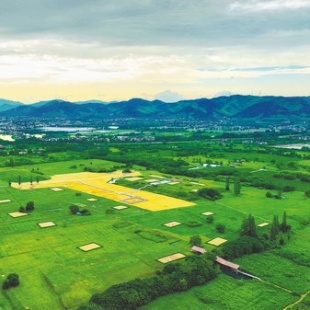A natural bond


"We believe that each mini-platform was the base of a small abode that could accommodate a family of two to four people. Very often, seven to 10 such platforms would be lined up in proximity with one another to form a settlement or village," says Wang. "And this village would be separated from a neighboring village by a distance of between 500 and 1,000 meters."
But why didn't the Liangzhu people build bigger platforms for larger houses? The answer lies in the surrounding paddy fields, maintained on a daily basis by the people who lived atop the earthen platforms.
"The relatively low crop yield of the time means that even feeding 20 to 30 people must have required a large field. If a platform big enough for 100 people to live on had been built, then those 100 people would have had to maintain a paddy field many times bigger," continues Wang. "That's where the problem would arise: to walk back and forth from their base to the far edge of that field several kilometers away would have been too time-consuming and tiring."





































